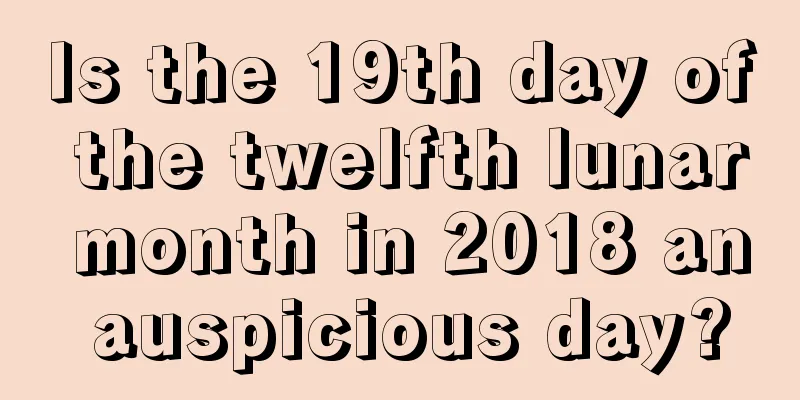What are the taboos on the fifth day of the Lunar New Year? What should you not do?

Introduction: There is a saying among the people that after the fifth day of the New Year, the customs and taboos from the first to the fourth day can be broken, and everything starts to be "taboo-free", so the fifth day is also called "Po Wu". Is this really the case? Is it really true that there are no taboos on the fifth day of the Lunar New Year? In fact, there are still many taboos on the fifth day of the Lunar New Year. Please see the analysis below for specific details. There is no end to the topics about the Spring Festival, so do you want to know more about it? Just continue to wander in Mr. Shui Mo’s Spring Festival special ocean!1. Taboo on the fifth day of the Lunar New Year: Setting off firecrackers is a mustOn the fifth day of the New Year, every household sets off firecrackers. People set off firecrackers from every house while walking out the door. The meaning is to blast away all the unlucky things, all the demons and monsters, and keep them as far away from us as possible. The farther the better. Especially setting off "double-kick firecrackers" is called "collapse of poverty", which can blow away the "bad luck" and "poverty" from the house.2. Taboo on the fifth day of the Chinese New Year: You must eat dumplingsOn the fifth day of the Lunar New Year, the common custom among the people is to eat dumplings, commonly known as "pinching the villain's mouth." Because when making dumplings, you need to use your hands to pinch the edges of the dumplings one by one. It is said that this can avoid slander around. In addition, women would find some old clothes to tear apart on this day, which is called "tearing apart the little man." This will avoid bad luck. According to the old custom, people have to eat "water dumplings" for five days, which is called "boiled buns" in the north. Nowadays, some families only eat it for three or two days, some eat it every other day, but there is no one who doesn't eat it. This is true from the mansions of princes to the small households in the streets and alleys, and even when entertaining guests. On the fifth day of the Lunar New Year, some places also wrap coins, candied dates, brown sugar, etc. in dumplings, which symbolize getting rich, good luck, sweetness and beauty.3. Taboo on the fifth day of the Lunar New Year: Be sure to clear the garbageIt is imperative to clean up the garbage created during the New Year, which is called "sending away poverty", otherwise it will bring poverty. Send the stove ash and garbage from the house out of the door, then set off firecrackers to drive away evil spirits. It means sending away poverty and welcoming wealth and happiness in the new year.4. Taboos on the fifth day of the Chinese New Year: You must not do anythingAccording to old customs, it is not advisable to do anything on the fifth day of the New Year, otherwise you will suffer financial losses in the year. During the “Five Busy Days”, no earthwork is allowed, otherwise disasters may occur. Regardless of the north or south, people used to be taboo about eating lotus roots and combing their hair. But these are all superstitious beliefs.5. Taboos on the fifth day of the Chinese New Year: Do not visit neighbors"Yanjing Sui Shi Ji" said: The fifth day of the lunar month is called "Po Wu". During "Po Wu", no raw rice can be used for cooking and women are not allowed to go out. On the sixth day, princesses, noble ladies, eunuchs and others came and went in their attire and congratulated each other. Newly married women also returned home on the same day, and merchants gradually resumed their trade. "Qing Bi Lei Chao" also records: The fifth day of the first lunar month is called "Po Wu", and women are not allowed to go out. Legend has it that Jiang Taigong appointed his wife the Goddess of Poverty and ordered her to "return home when she sees poverty." In order to avoid the God of Poverty, people called this day "Po Wu". Not visiting neighbors on the fifth day of the first lunar month is actually to avoid seeing the God of Poverty, that is, the young wife. In some places, it is simply called "Send the poor wife out on the fifth day and welcome the God of Wealth." In fact, it was a kind of disrespect for women in ancient times. In addition, elderly people are reluctant to visit relatives and friends on this day, and are not allowed to visit other people's homes, saying that visiting relatives will bring bad luck to other people's homes.Summary: After reading the introduction in the above article, we know that the fifth day of the Chinese New Year is not "free of taboos". As a part of the Spring Festival, there are still many customs and taboos on the fifth day of the Chinese New Year. Everyone can learn more about it! (This article has been completed. More exciting content is in the Spring Festival special. Let’s take a look!) |
<<: The seventh day of the Lunar New Year is Renri. What is Renri Festival?
Recommend
Is July 1, 2019, the Party Founding Day, suitable for setting up a bed? How do you say Party Founding Day in English?
Introduction: Setting up the bed is also an import...
Is the fifth day of the tenth lunar month in 2022 an auspicious day? Is the fortune good?
Is the fifth day of the tenth lunar month in 2022 ...
What are the English words for Merry Christmas? The latest Christmas greetings in 2021
Every Christmas is a joyous festival worth celebra...
Is October 21, 2022 a good date for engagement? How much is the engagement change fee usually given?
Is October 21, 2022 a good date for engagement? Ho...
Is the fate of a girl born on August 19th of the lunar calendar good? Born to bring good luck to parents?
Introduction: There are tens of thousands of human...
Analysis of the fate of a baby boy born on the fifth day of the eighth lunar month in 2022
If we can accurately grasp the future development ...
Analysis of the direction of the God of Happiness on October 17th of the lunar calendar in the Year of the Rat, 2020!
The tenth month of the lunar calendar is also cal...
What is the fate of a child born on the seventh day of the eighth lunar month? Is fate good or bad?
Introduction: In our tradition, people usually cel...
Is the ninth day of the twelfth lunar month in 2021 suitable for praying? Is it a good day?
The days of the twelfth month of the lunar calenda...
Is it auspicious to get married on the Minor Snow solar term in 2019? What zodiac sign is incompatible with this day?
The wedding date should be an auspicious day for t...
Query the lunar calendar and the auspicious and unlucky time for March 18, 2017
Introduction: The Yellow Calendar, also known as t...
Is the first day of the fourth lunar month in 2022 a bad day? Can’t propose marriage on that day?
Different days have different pros and cons, so pr...
When is the White Dew solar term and what is the fortune on this day?
Different days have different taboos for people. L...
What are the do's and don'ts on November 21, 2018?
In the eleventh month of the lunar calendar, the ...
Check the lunar calendar for the fourth day of the sixth lunar month in 2019. Is it a good day?
"After all, the scenery of West Lake in June...









